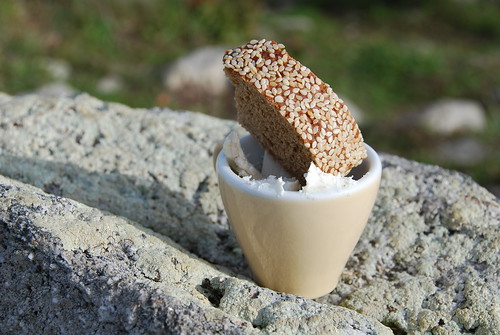 Sometimes I marvel at the difficulty we have with food. We have to much! No wait... there's not enough. Ah, but it is of such low quality! No- it's too expensive!! We need to diet! No, we need exercise more! Let's go GMO and synthetic all the way! No! Organic! Local! Fresh! Raw! ALIVE! GYAAAH!!
Sometimes I marvel at the difficulty we have with food. We have to much! No wait... there's not enough. Ah, but it is of such low quality! No- it's too expensive!! We need to diet! No, we need exercise more! Let's go GMO and synthetic all the way! No! Organic! Local! Fresh! Raw! ALIVE! GYAAAH!!I, for one, sometimes feel as though I have no idea what to eat. In such moments of gastronomic crisis, I return to Michael Pollen's wise words from his book In Defense of Food: "Eat food, not too much, mostly plants."
It seems so simple- deceptively so, actually. Pollen's advice to not "eat anything your great-grandmother wouldn't recognize as food" makes perfect sense, but what about all the foods that resemble what she used to eat?
Take sugar, for example. We have many low and no calorie substitutes these days. They pretty much look and taste like real sugar, but they aren't. Are we to avoid those, too?
I'm thinking yes, especially after reading about 17-year-old Smitha Ramakirshna's recent science project, which placed her amongst the finalists of the 2009 Intel Science Talent Search. Smitha found that Splenda "can accumulate in the water supply after people excrete it, potentially harming fish and other living things."
Odd chemical issues aside, I still think it advisable to avoid processed foods, especially those advertised as low-calorie or low-fat. First off, they're expensive. Second, I am tempted to eat more of them, because they're less satisfying and they wear off quickly. In addition, the processing and packaging involved isn't all that great for the environment.
If you're out to cut calories, eat healthier, or lose weight, I'd recommend the taking Pollen's advice. I feel there is a very strong argument for sticking to good old fashioned food. It's good for local farmers, it's good for the environment, and it's good for you, too.
I'm not going to pretend that local, organic food isn't sometimes more expensive, but higher prices have their benefits. Not only are you paying for the real price of your food (whereas with processed foods, you are often not paying for the environmental damage the food inflicts), you are buying less. By opting for quality and not quantity, you have natural portion control, and really fresh, delicious food. Yum!
Ok, so maybe you're on board with buying real food and not what Michael Pollen would refer to as "edible food-like substances," but you hesitate because buying natural staples and actually cooking your own meals seems like a formidable, time-consuming task. Not to worry! You'll find that cooking and baking on your own, once you have some basic tools, is ridiculously easy. For instnace, I used to make cakes using boxed mixes, but then I tried making a cake from scratch, and realized it took only a couple of extra minutes and ingredients. I haven't gone back to boxes since, and I must admit, it feels good to say you've made something from scratch. It's as though you truly own your food.
Thanks to the Internet, we have millions of recipes at our fingertips, and thanks to weekends, we also have the ability to create our own microwavable frozen meals. I and many of my friends like to bake large batches on the weekends, then separate leftoveres into indivudually packaged portions that can be heated up and enjoyed throughout the week. It doesn't take much time, plus it saves money and materials, and peppers long workdays with savory, home-cooked meals.
When it comes to food, there are no clear-cut answers. One food that seems to be healthy and ethical can be worse than its alternatives. Also, it is nearly impossible for us to go all natural or all organic or all local- at least for now. That said, it doesn't have to be hard to eat well. The most important thing is to exercise common sense and stick to meals that are as traditional, natural, and local as possible. Try to select foods with ingredients that you can picture growing naturally, and have fun with your meals. When all else fails, never fear; just remember to "eat food, not to much, mostly plants."
If you'd like to hear Michael Pollen talk about his food philosophy, click here to listen to an NPR interview on In Defense of Food.
You can also get a basic summary of his philosophy from this NY Times Article.





No comments:
Post a Comment